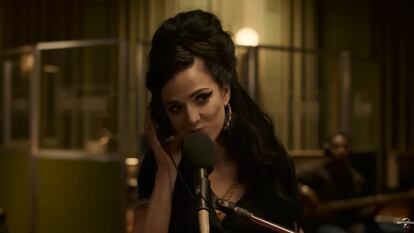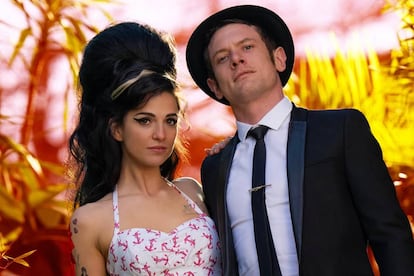‘Back to Black’: Amy Winehouse, always back to black
Sam Taylor-Johnson’s direction is correctly done, but it’s impossible to ignore Marisa Abela, who brings to life a woman who is so painful, cyclothymic, intense, sensual, foul-mouthed and magnetic

Cinema has always made biopics tailored to consumers about great musicians and singers who charmed mass audiences with their unquestionable artistry and personalities that could win over anyone. But in recent years, the computers or the production companies’ income statements must have discovered that the business is very profitable, that there is a sizeable audience willing to go to the movies to see the lives of these legendary figures reconstructed. It doesn’t matter if they are dead or if they are alive and still producing dazzling work despite their old age.
The abusive biopic genre is delighted when the glorious but tormented star puts an end to their self-destruction, reviews their conscience, finds a powerful reason to redeem themselves, stops feeling alone and stages a comeback, putting on a historic concert and recording exceptional albums. Johnny Cash got off speed; Elton John, cocaine; Ray Charles, heroin; Freddie Mercury died from AIDS, but he was clean of drugs. And of course, there could be no happy ending in Clint Eastwood’s moving, tragic and masterful portrait of the sax-playing god named Charlie Parker in the movie Bird. Eastwood did not follow any pattern of success to talk about the addicted genius. That film is great, as is Amadeus, in which Milos Forman recreated Mozart. But most of the infinite number of biopics about legendary musical figures (there are better ones and worse ones) are easily forgettable.

Singer and songwriter Amy Winehouse did not have much time on earth to create an enduring body of work, but in her 27 years of life (an age that was also fateful for other exceptional musicians such as Jimi Hendrix, Kurt Cobain, Janis Joplin, Brian Jones, Robert Johnson and Jim Morrison), she demonstrated with just a couple of albums that she possessed a unique talent, voice, swing, style and feeling. She loved jazz and blues, and her songs were infused with those sounds. Those privileged enough to have seen her live on stage say that she seemed broken and distressed until she grabbed the microphone and started singing. I did not have the privilege of seeing her perform live.
But you never get tired of listening to her album Back To Black. This is also the name of the biopic. Sam Taylor-Johnson’s direction is correct. But nothing more. But it is impossible to ignore that woman who is so painful, cyclothymic, intense, sensual, foul-mouthed and magnetic when the excellent actress Marisa Abela (who I did not know until now) appears, giving life, passion and helplessness to Amy Winehouse. The actress shows her frequent and progressive state of alcoholism, sometimes happy but increasingly unhappy. And how the singer combined or alternated alcohol with other drugs, including heroin, which she became addicted to thanks to her scrupleless thug boyfriend, with whom she has an exhausting romantic (or sadomasochist?) relationship. The movie also shows how the scandal-riddled life of the diva was affected by the torturous harassment of journalists and the paparazzi. Marisa Abela makes Amy Winehouse credible, torn, tender and complex.
You understand her, you admire her and you pity her. She is magnetic. The person I can’t stand is the insubstantial father, a Jewish taxi driver who is always fussing around his daughter, although I doubt he helped her with anything concrete. And I also hate her junkie boyfriend. I only paid attention to her, so artistic and so afflicted.
Back to Black
Director: Sam Taylor-Johnson.
Cast: Marisa Abela, Eddie Marsan, Jack O'Connell, Lesley Manville.
Genre: Biopic. United Kingdom, 2024.
Running time: 122 minutes.
Sign up for our weekly newsletter to get more English-language news coverage from EL PAÍS USA Edition
Tu suscripción se está usando en otro dispositivo
¿Quieres añadir otro usuario a tu suscripción?
Si continúas leyendo en este dispositivo, no se podrá leer en el otro.
FlechaTu suscripción se está usando en otro dispositivo y solo puedes acceder a EL PAÍS desde un dispositivo a la vez.
Si quieres compartir tu cuenta, cambia tu suscripción a la modalidad Premium, así podrás añadir otro usuario. Cada uno accederá con su propia cuenta de email, lo que os permitirá personalizar vuestra experiencia en EL PAÍS.
¿Tienes una suscripción de empresa? Accede aquí para contratar más cuentas.
En el caso de no saber quién está usando tu cuenta, te recomendamos cambiar tu contraseña aquí.
Si decides continuar compartiendo tu cuenta, este mensaje se mostrará en tu dispositivo y en el de la otra persona que está usando tu cuenta de forma indefinida, afectando a tu experiencia de lectura. Puedes consultar aquí los términos y condiciones de la suscripción digital.









































